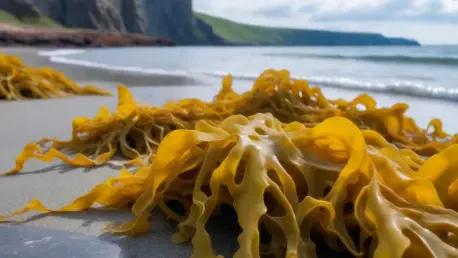In the coastal regions of Granada, Spain, an environmental challenge of staggering proportions has emerged as thick layers of sargassum, a type of brown algae, wash ashore, smothering beaches and threatening local economies. This invasive phenomenon, fueled by rising ocean temperatures, global warming, and nutrient pollution from agricultural runoff, has transformed from a sporadic nuisance into a persistent crisis, impacting tourism, public health, and marine ecosystems. Far from being merely a burden, however, this issue is being reframed as a unique chance for innovation. Authorities and international partners are pioneering sustainable solutions to harness the potential of sargassum, turning an ecological threat into a resource for green industries. This shift not only addresses immediate concerns but also sets a precedent for tackling environmental challenges with creativity and collaboration, offering hope for affected coastal communities worldwide.
Harnessing a Natural Resource for Industry
The sheer volume of sargassum inundating Granada’s shores has been staggering, with estimates suggesting millions of tons reaching the Caribbean region annually, leading to resort closures and declining tourism revenue. This algae, when left to decompose on beaches, releases toxic gases that pose health risks, particularly to vulnerable groups like pregnant women and those with respiratory conditions. Instead of resorting to harmful disposal methods such as sinking the algae into the sea or allowing it to pile up on shorelines, innovative minds in Spain are exploring its potential as a raw material. Over recent years, projects have yielded promising results, with sargassum being transformed into prototypes for cosmetics, fertilizers, biofuels, and even construction materials. These developments highlight the algae’s versatility and its capacity to serve as a cornerstone for sustainable industries, reducing waste while creating economic opportunities in regions hardest hit by the crisis.
Beyond product innovation, the focus on industrial applications of sargassum represents a broader movement toward a circular economy in Granada and similar coastal areas. By processing the algae into biodegradable materials and renewable energy sources through techniques like pyrolysis, dependence on fossil fuels can be significantly reduced. Additionally, sargassum-based fertilizers and biostimulants offer a natural alternative to chemical products, aiding in soil restoration and promoting sustainable agriculture. These initiatives not only mitigate the environmental damage caused by unchecked accumulation but also protect coastal ecosystems from erosion and storm vulnerability. The economic benefits are equally compelling, as new markets for green products emerge, providing alternative income sources for communities previously reliant on tourism. This multifaceted approach underscores the potential to turn an environmental crisis into a driver of long-term prosperity.
Fostering International Collaboration
Addressing the sargassum invasion requires more than local ingenuity; it demands a coordinated global response, and Spain is at the forefront of such efforts. Through initiatives like the European Union’s Global Gateway, governments, private companies, and scientific experts are uniting to fund and develop technologies for efficient collection and processing of the algae. Countries across the Caribbean, including Granada, Mexico, and the Dominican Republic, have committed to ambitious targets, aiming to collect over 660,000 tons of sargassum between now and 2027. The strategy emphasizes early removal from the ocean to prevent beach accumulation, thereby minimizing ecological damage and health risks. This collaborative framework ensures that solutions are scalable and adaptable to the unique needs of different regions, setting a model for tackling transboundary environmental issues with shared resources and expertise.
Equally important is the emphasis on empowering local communities within these international partnerships. In Granada and beyond, the focus is not just on removing sargassum but on ensuring that Caribbean populations benefit economically from its transformation into high-value products like textiles and personal care items. By involving local stakeholders in collection efforts and value-added processing, these initiatives reduce reliance on tourism, a sector severely impacted by the algae crisis, and foster greater autonomy for small island states. This approach also builds resilience against future environmental challenges by creating diversified economic opportunities. The collaborative efforts highlight a shared commitment to sustainability, demonstrating that global cooperation can transform a widespread problem into a catalyst for regional development and environmental stewardship.
Building a Sustainable Future from Crisis
Reflecting on the journey so far, the response to the sargassum invasion in Granada reveals a remarkable shift in perspective, where what was once viewed as a debilitating threat became a source of innovation and growth. Through persistent efforts, local authorities and international partners crafted solutions that turned heaps of algae into valuable resources, from biofuels to biodegradable materials. The dedication to preventing beach accumulation safeguarded public health and protected fragile coastal ecosystems, while the development of green industries provided a lifeline to economies battered by declining tourism. This transformative process, driven by creativity and collaboration, showcased the power of reimagining environmental challenges as opportunities for sustainable progress.
Looking ahead, the next steps involve scaling these initiatives to ensure lasting impact across the Caribbean and beyond. Investment in biorefineries to convert sargassum into chemical compounds must be prioritized, alongside community-led management of collection and processing technologies. Expanding the regional value chain will further integrate local economies into global markets for green products, ensuring that benefits are widely shared. Continued international support and funding will be crucial to maintain momentum and adapt solutions to evolving environmental conditions. By building on the foundation laid in Granada, affected regions can redefine their relationship with the marine environment, turning a persistent crisis into a blueprint for resilience and sustainable development.









